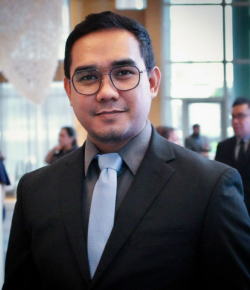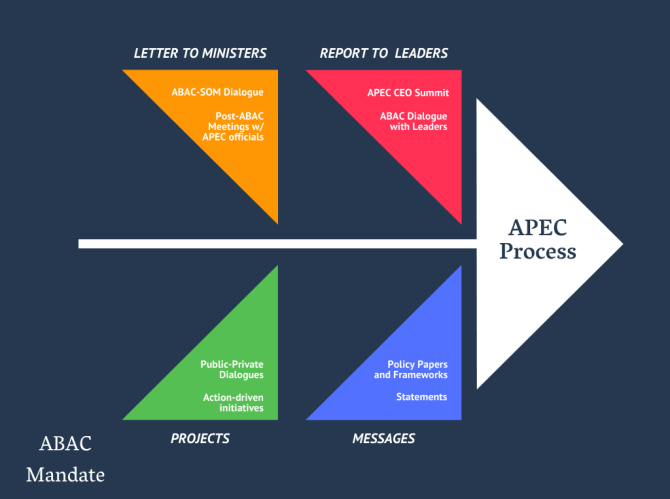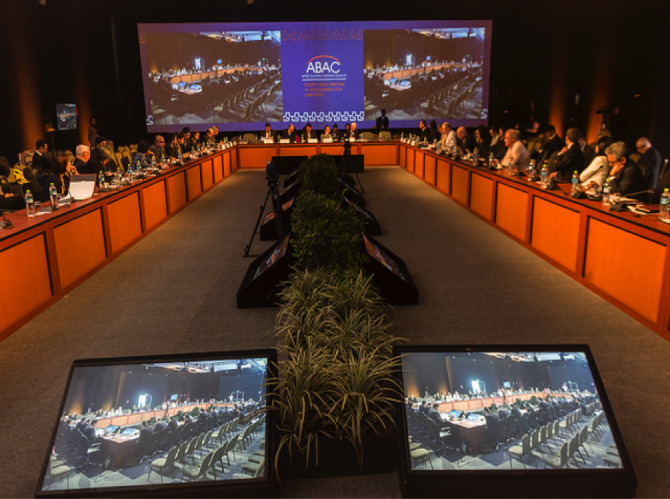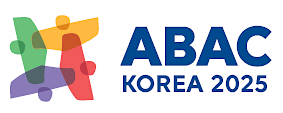

Froland Tajale
Lead Staffer


Don Jaime Gaisano
Staffer
Maricel Pamittan
Staffer

APEC Leaders, in 1995, established the APEC Business Advisory Council (ABAC) tasked to provide private sector perspective towards achieving free and open trade and investments in the Asia Pacific region (Bogor goals). In 2020, Leaders adopted the Putrajaya Vision, for an open, dynamic, resilient and peaceful Asia-Pacific community by 2040, for the prosperity of all our people and future generations.
The Council had its first meeting and dialogue with the Leaders in 1996, when the Philippines first chaired APEC. Ambassador Roberto Romulo of the Philippines served as ABAC’s founding chairman.
Every year, ABAC submits a Report to APEC Leaders which outlines key recommendations focused on regional economic integration. ABAC also engages with Ministers, especially those responsible for Trade, Finance, SME, Energy, Food Security, Health, and Women to address urgent challenges.

ABAC is composed of three executives per economy, appointed by the respective President or Prime Minister, and their designated alternates. The members meet four times a year, one every quarter, each running 3-4 days.
ABAC discusses its priorities under five working groups: (1) Regional Economic Integration, (2) Finance and Economics, (3) MSME and Inclusiveness, (4) Sustainability, and (5) Digital.
As the voice of business in the region, ABAC provides advice to Leaders – recommending policy and regulatory reforms, as well as initiatives that would help achieve APEC Goals. This is essentially done at the ABAC Dialogue with Leaders which takes place during the Annual Economic Leaders Meeting.
There is also a Dialogue with APEC Senior Officials during the first ABAC meeting of the year. ABAC reports to APEC officials every after ABAC meeting for updates and alignments.

ABAC 2025, under the chairmanship of the Korea with the Theme: “Bridge. Business. Beyond.” will focus on the following:
Regional Economic Integration Working Group: (1) Economic Integration Architecture; (2) Facilitating Trade & Supply Chains; (3) Digital Trade; and (4) Inclusive & Sustainable Trade.
Sustainability Working Group: (1) Green Growth & Low-Carbon Economy; (2) Energy Security & Energy Transition; and (3) Food Security & Sustainable Agriculture.
AI & Digital Innovation Working Group: (1) Sustainably Powering the Digital Economy; (2) Bridging the Digital Divide; (3) Future Proofing the Digital Economy; (4) Digital Ministerial Engagement; and (5) Cross Cutting Projects.
Finance & Economics Working Group: (1) Financing Investment Gaps for Digital Transformation, Energy Transition & Security; (2) Financial Inclusion for Development; (3) Resilient Financial Systems for Trade, Investment & Development; (4) ABAC Contribution to developing a New Finance Minister's' Process Roadmap; and (5) Implementation of ABAC Recommendations.
Bio & Healthcare Working Group: (1) Accelerating Biotech Innovation for Smart Health; (2) Build Interconnected Health Network for Medical Resilience; (3) Narrowing the Divide for Inclusive Health; and (4) Public Private Partnership for Future Health.



